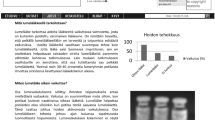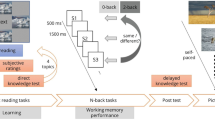Abstract
This paper reviews some of the recent models of selective attention and concludes that these models simplify and restrict the role of attention in reading and learning. It is maintained that the most critical problem of the models is that they do not acknowledge the important function of attention in the early stages of the reading process when meaning and importance ratings are first established. It is further suggested that reading and secondary task reaction times which have been used to measure attention, are inadequate as they cannot distinguish between different attention phases. A new model of how attention affects text comprehension is proposed. Finally, it is argued that to examine the complex effects of attention on reading and learning, novel research questions should be asked, and new ways to evaluate attention must be considered. More specifically, research on attention by cognitive and educational psychologists should utilize neuroscientific brain research methods, such as event-related potentials, and should integrate findings across research domains.
Similar content being viewed by others
References
Anderson, R. C. (1982). Allocation of attention during reading. In Flammer A., and Kintsch, W. (eds.),Discourse Processing, North Holland, Amsterdam, pp. 287–299.
Anderson, V., and Henne, R. (1993).Collaborative, Integrated Reading and Writing Strategy Instruction. Paper presented at the Annual Meeting of the National Reading Conference, Charleston, SC.
Anderson, R. C., Mason, J., and Shirey, L. (1984). The reading group: An experimental investigation of a labyrinth.Reading Res. Quart. 20: 6–36.
Berman, K. F. (1987). Cortical “stress tests” in schizophrenia: Regional cerebral blood flow studies.Biol. Psychiat. 22: 1304–1326.
Britton, B. K., Piha, A., Davis, J., and Wehausen, E. (1978). Reading and cognitive capacity usage: Adjunct question effects.Memory Cognit. 6: 266–273.
Britton, B. K., Meyer, B. J. F., Simpson, R., Holdridge, T. S., and Curry, C. (1979). Effects of the organization of text memory: Tests of two implications of the selective attention hypothesis.J. Exp. Psychol. Human Learn. Mem. 5: 496–506.
Broadbent, D. E. (1958).Perception and Communication Pergamon, London.
Broadbent, D. E. (1982). Task combination and the selective intake of information.Acta Psychol. 50: 253–290.
Caine, N. R., and Caine, G. (1991).Making Connection: Teaching and the Human Brain, Association for Supervision and Curriculum Development, Alexandria, VA.
Cirilo, R. K., and Foss, D. J. (1980). Text structure and reading time for sentences.J. Verb. Learn. Verb. Behav. 19: 96–109.
Coles, M. G. H. (1992). Attention and information processing: A psychophysiological perspective. In Campbell, B. A., Hayne, H., and Richardson, R. (eds.),Attention and Information Processing in Infants and Adults: Perspectives from Human and Animal Research, Lawrence Erlbaum Associates, Hillsdale, NJ, pp. 325–337.
Coles, M. G. H., Gratton, and Fabiani (1990). Event-related brain potentials. In Cacioppo, J. T., and Tassinary, L. G. (eds.),Principles of Psychophysiology, Cambridge University Press, New York, pp. 413–455.
Desmedt, J. E., and Tomberg, C. (1989). Mapping early somatosensory evoked potentials in selective attention: Critical evaluation of control conditions used for titrating by difference the cognitive P30, P40, P100 and N140.Electroencephalog. Clin. Neurophysiol. 74: 321–346.
Dunn, D. A., Hidi, S., Dunn, B. R., Peters, P., Thompson, M. K., and VanDyke, P. (April 1993).Electrophysiological Correlates of Reading Interest Level of Sentences. Paper presented at the Annual Meeting of the American Educational Research Association, Atlanta, GA.
Garner, R., Brown, R., Sanders, S., and Menke, D. J. (1992). “Seductive details” and learning from text. In Renninger, K. A., Hidi, S., and Krapp, A. (eds.),The Role of Interest in Learning and Development, Lawrence Erlbaum Associates, Hillsdale, NJ, pp. 239–254.
Gomulicki, B. R. (1956). Recall as an abstractive process.Acta Psychol. 12: 77–94.
Hidi, S. (1990). Interest and its contribution as a mental resource for learning.Rev. Educ. Res. 60(4): 549–571.
Hidi, S. (April 1992).Attention and Situational Interest. Paper presented at the Annual Meeting of the American Educational Research Association, San Francisco.
Hidi, S., and Anderson, V. (1992). Situational interest and its impact on reading and expository writing. In Renninger, K. A., Hidi, S., and Krapp, A. (eds.),The Role of Interest in Learning and Development, Lawrence Erlbaum Associates, Hillsdale, NJ, pp. 215–238.
Hillyard, S. A., and Hansen, J. C. (1986). Attention: Electrophysiological approaches. In Coles, M. G. H., Donchin, E., and Porges, S. W. (eds.),Psychophysiology: Systems, Processes, and Applications, Guilford Press, New York.
Hyönä, J. (1994). Processing of topic shifts by adults and children.Reading Res. Quart. 29(1): 77–88.
Jacoby, L. L. (1983a). Perceptual enhancement: Persistent effects of an experience.J. Exp. Psychol.: Learn., Mem., Cognit. 9: 21–38.
Jacoby, L. L. (1983b). Remembering the data: Analyzing interactive processes in reading.J. Verb. Learn. Verb. Behav. 22: 485–508.
Jacoby, L. L., Levy, B. A., and Steinback, K. (1992). Episodic transfer and automaticity: Integration of data-driven and conceptually driven processing in reading.J. Exp. Psychol.: Learn., Mem., Cognit. 18: 15–24.
James, W. (1890).The Principles of Psychology, MacMillan, London.
Jennings, J. R. (1986). Bodily changes during attention. In Coles, M. G. H., Donchin, E., and Porges, S. W. (eds.),Handbook of Physiology: Vol. 2. The Respiratory System Guilford Press, New York, pp. 268–289.
LaBerge, D., and Samuels, S. (1974). Toward a theory of automatic information processing in reading.Cognit. Psychol. 6: 293–323.
Marslen-Wilson, W. D. (1987). Functional parallelism in spoken word-recognition.Cognition 25.
Marton, M. (1990). Az olvasott tortenet erdekesseget tukrozo agyi potencialok?Pszichologia 10: 51–84.
Marton, M. (1992). Informacio feldolgozas szavankenti es folyamatos szoveg olvasasko,Pszichologia (12)2: 155–172.
Marton, M., and Szirtes, J. (1988a). Context effects on saccade-related brain potentials to words during reading.Neuropsychologia 26(3): 453–463.
Marton, M., and Szirtes, J. (1988b). Saccade-related brain potentials during reading correct and incorrect versions of proverb.Int. J. Psychophysiol. 6: 273–280.
McClelland, J. L., and Elman, J. L. (1986). The TRACE model of speech perception.Cognitive Psychology 18: 1–86.
McGuinness, D., and Pribram, K. (1980). The neuropsychology of attention: Emotional and motivational controls. In Wittrock, M. C. (ed.),The Brain and Psychology, Academic Press, New York, pp. 95–139.
McLaren, J., and Hidi, S. (April 1991).Text-Based Interest: Facilitative and Disruptive Effects on Adult's Knowledge Acquisition. Paper presented at the Annual Meeting of the American Educational Research Association, Chicago.
Millis, K. K., Morgan, D., and Graesser, A. C. (1990). The influence of knowledge-based inferences on the reading time of expository text. In Graesser, A. C., and Bower, G. H. (eds.),The Psychology of Learning and Motivation: Vol. 25. Inferences and Text Comprehension, Academic Press, San Diego.
Näätänen, R. (1988). Implications of ERP data for psychological theories of attention.Biol. Psychol. 26: 117–163.
Neisser, U. (1967).Cognitive Psychology, Appleton-Century-Crofts, New York.
Perfetti, C. A. (1985).Reading Ability, Oxford University Press, New York.
Posner, M. I. (1980). Orienting of attention.J. Exp. Psychol. 32: 3–26.
Posner, M. I., and Friedrich, F. J. (1986). Attention and the control of cognition. In Friedman, S. L., Klivington, K. A., and Peterson, R. W. (eds.),The Brain, Cognition, and Education, Academic Press, Orlando, FL, pp. 81–103.
Posner, M. I., and Petersen, S. E. (1990). The attention system of the human brain.Ann. Rev. Neurosci. 13: 25–42.
Prenzel, M. (1992). The selective persistence of interest. In Renninger, K. A., Hidi, S., and Krapp, A. (eds.),The Role of Interest in Learning and Development Lawrence Erlbaum Associates, Hillsdale, NJ, pp. 71–98.
Raney, G. E. (1993). Monitoring changes in cognitive load during reading: An event-related brain potential and reaction time analysis.J. Exp. Psychol.: Learn., Mem, Cognit. 19(1): 51–69.
Renninger, K. A. (1992). Individual interest and development: Implications for theory and practice. In Renninger, K. A., Hidi, S., and Krapp, A. (eds.),The Role of Interest in Learning and Development, Lawrence Erlbaum Associates, Hillsdale, NJ pp. 361–396.
Reynolds, R. E. (1980).Cognitive Capacity Usage in Prose Learning. Paper presented at the Meeting of the American Educational Research Association, Boston, MA.
Reynolds, R. E. (1992a). Selective attention and prose learning: Theoretical and empirical research.Educ. Psychol. Rev. 4(4): 345–391.
Reynolds, R. E. (1992b).Metaphors in Text: Implications for Theories of Prose Learning, manuscript submitted for publication.
Reynolds, R. E., and Anderson, R. C. (1982). Influence of questions on the allocation of attention during reading.J. Educ. Psychol. 74: 623–652.
Reynolds, R. E., Standiford, S. N., and Anderson, R. C. (1979). Distribution of reading time when questions are asked about a restricted category of text information.J. Educ. Psychol. 7: 183–190.
Reynolds, R. E., Shepard, C., Lapan, R., Kreck, C., and Goetz, E. T. (1990). Differences in the use of selective attention by more successful and less successful tenth-grade readers.J. Educ. Psychol. 84(4): 749–759.
Reynolds, R. E., Wade, S. E., Trathen, W., and Lapan, R. (1989). The selective attention strategy and prose learning. In McCormick, C. B., Miller, G. E., and Pressley, M., (eds.),Cognitive Strategy Research: From Basic Research to Educational Applications, Springer-Verlag, New York, pp. 159–190.
Richards, J. E., and Casey, B. J. (1992). Development of sustained visual attention in the human infant. In Campbell, B. A., Hayne, H., and Richardson, R. (eds.),Attention and Information Processing in Infants and Adults: Perspectives from Human and Animal Research. L. Erlbaum Assoc., Hillsdale, NJ.
Richards, J. P., and Denner, P. R. (1978). Inserted questions as aids to reading text.Instr. Sci. 1: 313–346.
Rosenblatt, L. M. (1978).The Reader, the Text, the Poem: The Transaction Theory of the Literary Work, Southern Illinois University Press, Carbondale.
Rothkopf, E. Z., and Billington, M. J. (1979). Goal-guided learning from text: Inferring a descriptive processing model from inspection times and eye movements.J. Educ. Psychol. 71: 310–327.
Rumelhart, D. (1976).Toward an Interactive Model of Reading. Technical report no. 56, University of California, Center for Human Information Processing, San Diego.
Sharpless, S., and Jasper, H. (1956). Habituation of the arousal reaction.Brain 79: 655–680.
Shiffrin, R. M., and Schneider, W. (1977). Controlled and automatic human information processing: II. Perceptual learning, automatic attending, and a general theory.Psychol. Rev. 84: 90–190.
Shirey, L. L., and Reynolds, R. E. (1988). Effect of interest on attention and learning.J. Educ. Psychol. 80: 159–166.
Sohlberg, M. M., and Mateer, C. A. (1987). Effectiveness of an attention training program.J. Clin. Exp. Neuropsychol. 9: 117–130.
Sohlberg, M. M., and Mateer, C. A. (1989).Introduction to Cognitive Rehabilitation, Guilford Press, New York.
Stanovich, K. E. (1980). Toward an interactive-compensatory model of individual differences in the development of reading fluency.Reading Res. Quart. 16: 32–71.
Van Petten, C., and Kutas, M. (1990). Interactions between sentence context and word frequency in event-related brain potentials.Mem. Cognit. 18: 380–393.
Van Petten, C., Kutas, M., Kluender, R., Mitchiner, M., and McIsaac, H. (1991). Fractionating the word repetition effect with event-related potentials.J. Cognit. Neurosci. 3(2): 131–150.
Wade, S. E., Schraw, G., Buxton, W. M., and Hayes, M. T. (April 1993). Seduction of the Strategic Reader: Effects of Text-Based Interest on Attention and Recall. Paper presented at the Annual Meeting of the American Educational Research Association, Chicago.
Wittrock, M. C. (1986). Education and recent research on attention and knowledge acquisition. In Friedman, S. L., Klivington, K. A., and Peterson, R. W. (eds.),The Brain, Cognition, and Education, Academic Press, Orlando, FL, pp. 151–168.
Wittrock, M. C., and Lumsdaine, A. A. (1977). Instructional psychology. In Rosenweig, M. R., and Porter, L. W. (eds.),Ann. Rev. Psychol. 28: 417–459.
Author information
Authors and Affiliations
Rights and permissions
About this article
Cite this article
Hidi, S.E. A reexamination of the role of attention in learning from text. Educ Psychol Rev 7, 323–350 (1995). https://doi.org/10.1007/BF02212306
Issue Date:
DOI: https://doi.org/10.1007/BF02212306




